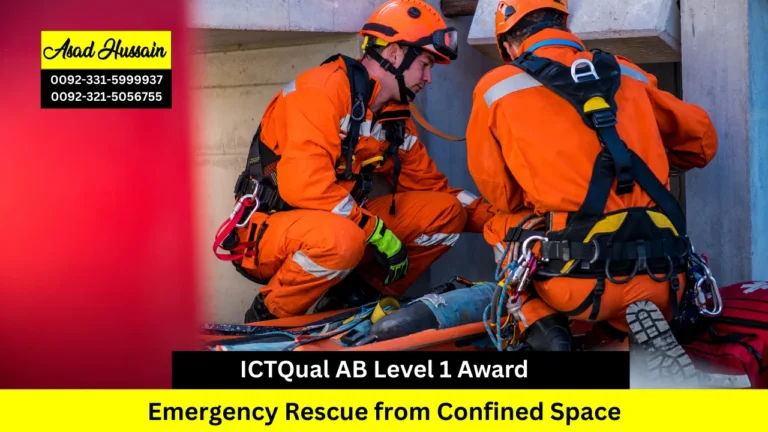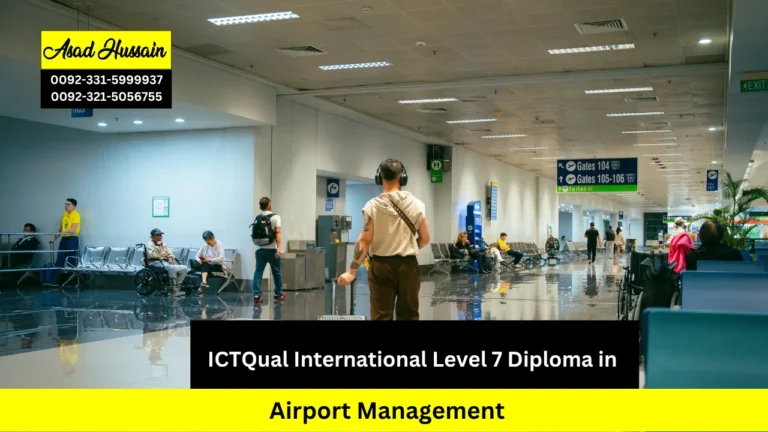Quantity surveying is a critical discipline within construction and civil engineering, ensuring accurate cost management, efficient resource allocation, and financial control throughout a project’s lifecycle. The ICTQual AB Level 6 International Diploma in Quantity Surveying equips learners with the advanced knowledge, practical skills, and strategic insight required to manage costs, contracts, and project resources effectively in both domestic and international construction projects.
ICTQual ABLevel 6 International Diploma in Quantity Surveying covers essential areas of quantity surveying, including cost estimation, procurement, contract administration, project planning, risk assessment, and financial reporting. Learners will develop competencies in preparing bills of quantities, tender documentation, cost control strategies, and value engineering, ensuring that projects are delivered on time, within budget, and to the highest quality standards.
Through a combination of theoretical instruction, case studies, and practical exercises, participants will acquire professional expertise to make informed financial and contractual decisions. Graduates will be prepared for roles in construction management, consultancy, cost control, and project oversight across a wide range of infrastructure, civil, and building projects. Completing this program enhances career prospects, strengthens professional credibility, and equips learners with internationally recognized skills to succeed in the competitive field of quantity surveying.
Program Highlights
Study Units
Year 1 – Foundation in Quantity Surveying
- Principles of Quantity Surveying
- Introduction to Construction Projects
- Construction Materials and Methods
- Project Planning and Scheduling
- Risk Assessment and Management
- Health, Safety, and Environmental Awareness
- Project Communication and Stakeholder Management
- Construction Technology Fundamentals
- Financial Management in Construction
- Quality Assurance and Control
- Legal and Regulatory Frameworks in Construction
- Professional Ethics and Conduct
Year 2 – Intermediate Quantity Surveying Practices
- Advanced Project Planning Techniques
- Resource Management and Allocation
- Project Cost Estimation and Budgeting
- Construction Contract Administration
- Procurement and Supply Chain Management
- Project Risk Analysis and Mitigation
- Leadership and Team Management
- Site and Workshop Management
- Sustainability and Environmental Management
- Project Monitoring and Reporting
- Problem-Solving and Decision-Making in Projects
- Communication and Negotiation Skills
Year 3 – Advanced Quantity Surveying and Strategic Leadership
- Strategic Quantity Surveying and Project Management
- Advanced Construction Cost Planning
- Infrastructure Project Management
- Innovation in Construction Projects
- Advanced Risk and Crisis Management
- Contract Management and Legal Compliance
- Leadership in Construction Projects
- Advanced Project Control and Performance Measurement
- Project Governance and Compliance
- Research Methods and Project Analysis
- Capstone Project in Quantity Surveying
- Professional Development and Career Planning
To ensure learners are fully prepared for the ICTQual AB Level 6 International Diploma in Quantity Surveying, specific entry requirements are in place. These criteria ensure that candidates have the necessary educational background, professional experience, and language proficiency to engage effectively with advanced quantity surveying concepts and apply them to real-world construction and civil projects.
Age Requirements
- Applicants must be 18 years or older to enroll in ICTQual ABLevel 6 International Diploma in Quantity Surveying.
- Mature learners over 21 years are encouraged, particularly those seeking professional growth in construction cost management.
Educational Requirements
- Candidates should hold a Level 5 qualification or equivalent in quantity surveying, construction management, civil engineering, or related fields.
- Relevant diplomas, technical certifications, or prior completion of construction management programs may also be considered.
Professional Experience
- Work experience in construction projects, cost estimation, contract administration, or project coordination is preferred.
- Practical experience in budgeting, procurement, or resource management enhances the application of course concepts.
English Language Proficiency
- Non-native English speakers must demonstrate proficiency through recognized tests such as IELTS 6.0 or equivalent.
- Effective English communication skills are essential for completing assessments, preparing reports, and engaging in professional documentation.
Meeting these entry requirements ensures learners are fully prepared to maximize the benefits of the course. By enrolling in this diploma, participants will gain the knowledge, practical skills, and professional credibility required to excel in quantity surveying, manage construction costs efficiently, and contribute strategically to the success of construction projects worldwide.
Upon successful completion of the ICTQual AB Level 6 International Diploma in Quantity Surveying, learners will gain advanced knowledge, practical skills, and professional competencies essential for managing cost, contracts, and financial control in construction and civil engineering projects.
1. Principles of Project Management
- Demonstrate understanding of project management frameworks and methodologies applicable to quantity surveying.
- Apply project lifecycle management to plan, monitor, and deliver construction projects effectively.
- Evaluate project objectives, deliverables, and resource allocation to ensure efficiency.
- Implement governance strategies to maintain accountability and optimize outcomes.
2. Introduction to Construction Projects
- Understand the fundamentals of construction and civil engineering projects relevant to quantity surveying.
- Analyze project scope, requirements, and design specifications to ensure feasibility.
- Integrate technical knowledge into decision-making for cost management and resource allocation.
- Assess project impact on operational efficiency, sustainability, and client satisfaction.
3. Construction Materials and Methods
- Evaluate the suitability, cost, and sustainability of construction materials.
- Apply modern construction methods to optimize efficiency and quality.
- Conduct assessments of environmental and safety implications of materials and techniques.
- Implement innovative approaches to minimize costs while maintaining project standards.
4. Project Planning and Scheduling
- Develop comprehensive project plans, timelines, and schedules using industry-standard tools.
- Apply critical path analysis and resource allocation strategies to enhance efficiency.
- Monitor progress, identify delays, and implement corrective actions to meet deadlines.
- Optimize workflow and resources to achieve project milestones effectively.
5. Risk Assessment and Management
- Identify and assess potential risks in construction and surveying projects systematically.
- Develop and implement mitigation strategies to minimize financial, operational, and safety risks.
- Monitor and review risk factors throughout the project lifecycle.
- Ensure proactive measures are in place to manage uncertainties and contingencies.
6. Health, Safety, and Environmental Awareness
- Assess workplace hazards and implement occupational health and safety protocols.
- Ensure compliance with environmental regulations and promote sustainable practices.
- Develop emergency response strategies and incident management plans.
- Foster a culture of safety, accountability, and environmental responsibility on-site.
7. Project Communication and Stakeholder Management
- Apply effective communication strategies for coordinating teams and stakeholders.
- Prepare professional reports, presentations, and project documentation.
- Manage stakeholder expectations, engagement, and conflict resolution.
- Utilize digital tools to enhance communication, collaboration, and transparency.
8. Technology Fundamentals in Quantity Surveying
- Understand and apply construction and surveying technologies such as CAD and BIM.
- Evaluate the impact of digital tools on project efficiency, planning, and reporting.
- Implement IT solutions for cost estimation, budgeting, and project monitoring.
- Integrate technology into decision-making to optimize project outcomes.
9. Financial Management in Projects
- Develop accurate cost estimates, budgets, and financial plans for construction projects.
- Apply financial monitoring and cost-control techniques to avoid overruns.
- Conduct feasibility studies and cost-benefit analyses for informed decision-making.
- Optimize resource allocation to achieve financial efficiency and project profitability.
10. Quality Assurance and Control
- Apply quality management principles to ensure compliance with project specifications.
- Conduct inspections, audits, and evaluations to maintain high-quality outcomes.
- Implement continuous improvement strategies to enhance construction processes.
- Monitor adherence to client, regulatory, and international quality standards.
11. Legal and Regulatory Frameworks in Construction
- Examine laws, regulations, and contractual obligations relevant to quantity surveying.
- Apply compliance strategies to ensure ethical and lawful project execution.
- Assess risks associated with non-compliance and implement mitigation measures.
- Evaluate the impact of international standards and legal frameworks on projects.
12. Professional Ethics and Conduct
- Demonstrate ethical decision-making and professional behavior in project management.
- Apply accountability, transparency, and responsibility in all surveying and management activities.
- Promote sustainable and socially responsible practices in construction projects.
- Uphold professional standards and codes of conduct in leadership and team management.
The ICTQual AB Level 6 International Diploma in Quantity Surveying equips learners with the advanced knowledge, technical skills, and practical expertise required to excel in the field of construction cost management and project delivery. By the end of this program, participants will have developed the capability to manage project finances, contracts, and resources efficiently, while applying industry best practices, ethical standards, and sustainable construction principles.
Year 1 – Foundation in Quantity Surveying
Principles of Quantity Surveying
- Understand the fundamental principles of quantity surveying and construction cost management.
- Apply basic techniques for estimating project costs, resources, and timelines.
- Develop foundational skills in project documentation and reporting.
- Demonstrate awareness of professional ethics and responsibilities in quantity surveying.
Introduction to Construction Projects
- Recognize different types of construction projects and their operational contexts.
- Analyze project requirements and objectives effectively.
- Develop initial project plans and feasibility assessments.
- Apply basic project management tools to construction workflows.
Construction Materials and Methods
- Identify properties and applications of common construction materials.
- Apply suitable construction methods to specific project requirements.
- Evaluate the impact of material choice on project cost, quality, and sustainability.
- Develop practical problem-solving skills related to construction processes.
Project Planning and Scheduling
- Develop comprehensive project schedules using standard planning tools.
- Allocate tasks and resources to meet project deadlines efficiently.
- Monitor project progress and adjust schedules to ensure timely delivery.
- Evaluate scheduling strategies for cost-effectiveness and productivity.
Cost Estimation and Budgeting
- Prepare accurate cost estimates for construction projects.
- Apply budgeting techniques to manage project finances effectively.
- Monitor and control expenditures throughout the project lifecycle.
- Analyze variances between planned and actual project costs.
Risk Management and Health & Safety Awareness
- Identify and assess potential risks in construction projects.
- Develop risk mitigation strategies and contingency plans.
- Demonstrate knowledge of health, safety, and environmental regulations.
- Apply safe work practices in construction and surveying environments.
Communication and Stakeholder Management
- Communicate project information effectively with stakeholders.
- Develop strategies for stakeholder engagement and conflict resolution.
- Prepare clear reports, presentations, and project documentation.
- Demonstrate professional interpersonal skills in a construction context.
Year 2 – Intermediate Quantity Surveying Practices
Advanced Cost Planning and Control
- Apply advanced techniques for cost planning and monitoring.
- Analyze financial performance and adjust strategies to control costs.
- Prepare detailed cost reports for stakeholders and clients.
- Implement best practices in budget management and resource allocation.
Contract Administration and Procurement
- Understand the principles of construction contracts and procurement processes.
- Manage contracts with clients, suppliers, and subcontractors effectively.
- Resolve disputes and enforce contractual obligations.
- Ensure compliance with legal, regulatory, and ethical standards.
Project Risk Analysis and Mitigation
- Conduct quantitative and qualitative risk analyses.
- Develop and implement effective mitigation strategies.
- Monitor risk factors throughout the project lifecycle.
- Evaluate the impact of risks on project cost and schedule.
Construction Measurement and Valuation
- Perform accurate measurement of quantities for construction projects.
- Prepare valuation reports for interim and final project payments.
- Apply measurement standards and industry guidelines.
- Develop practical skills in surveying and data analysis.
Leadership and Team Management
- Lead multidisciplinary teams in construction projects.
- Apply leadership techniques to motivate and manage teams.
- Resolve conflicts and ensure effective collaboration.
- Monitor team performance and implement improvements.
Sustainability and Environmental Management
- Integrate sustainable construction practices into project planning.
- Assess environmental impacts and implement mitigation measures.
- Promote eco-friendly approaches in cost planning and resource management.
- Apply sustainability principles to long-term project decision-making.
Problem-Solving and Decision-Making in Projects
- Analyze complex project challenges and propose effective solutions.
- Apply structured decision-making tools in quantity surveying.
- Evaluate outcomes and implement corrective actions.
- Demonstrate critical thinking and analytical reasoning in project contexts.
Year 3 – Advanced Quantity Surveying and Strategic Leadership
Strategic Project Management
- Develop strategic plans aligned with organizational goals.
- Apply advanced project management methodologies to large-scale projects.
- Evaluate project performance against key objectives.
- Implement strategies for successful project delivery and stakeholder satisfaction.
Advanced Contract and Procurement Management
- Manage complex contracts and procurement processes.
- Assess supplier performance and ensure compliance with contract terms.
- Negotiate agreements and resolve contractual disputes effectively.
- Apply international standards and best practices in construction procurement.
Innovation in Quantity Surveying
- Introduce innovative techniques for cost estimation and project control.
- Implement new technologies in surveying and project management.
- Evaluate the impact of innovations on efficiency, cost, and quality.
- Foster creative problem-solving within project teams.
Advanced Risk and Crisis Management
- Identify complex risks and potential crises in construction projects.
- Develop proactive crisis management and response strategies.
- Lead teams effectively during high-pressure situations.
- Monitor risk management plans for continuous improvement.
Capstone Project in Quantity Surveying
- Plan and execute a comprehensive construction project from start to finish.
- Apply knowledge, skills, and tools acquired throughout the program.
- Demonstrate professional competency in cost management, project planning, and contract administration.
- Present findings and recommendations through a formal project report and presentation.
Professional Development and Career Planning
- Develop a personal career roadmap in quantity surveying and construction management.
- Identify opportunities for continued professional growth and specialization.
- Reflect on personal strengths, skills, and achievements.
- Prepare for leadership roles and industry-recognized certifications.
Upon completing this diploma, learners will possess advanced technical knowledge, practical skills, and professional expertise to manage construction costs, contracts, and resources efficiently. Graduates will be fully prepared to lead complex construction projects, implement sustainable practices, and excel as highly employable quantity surveyors in local and international industries.







